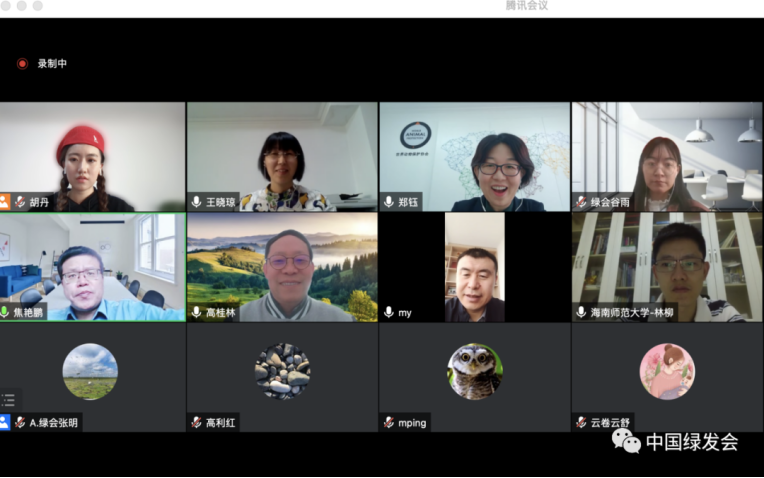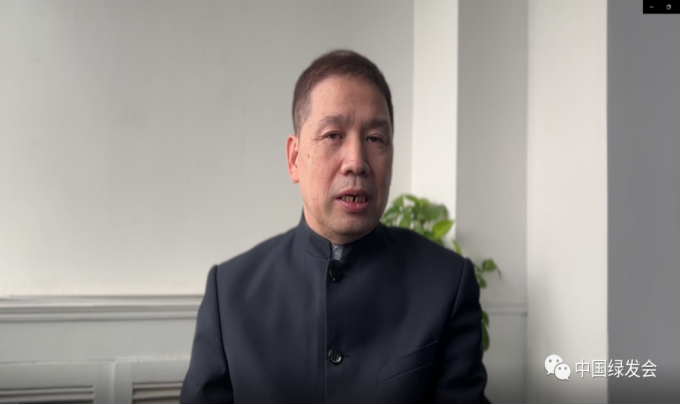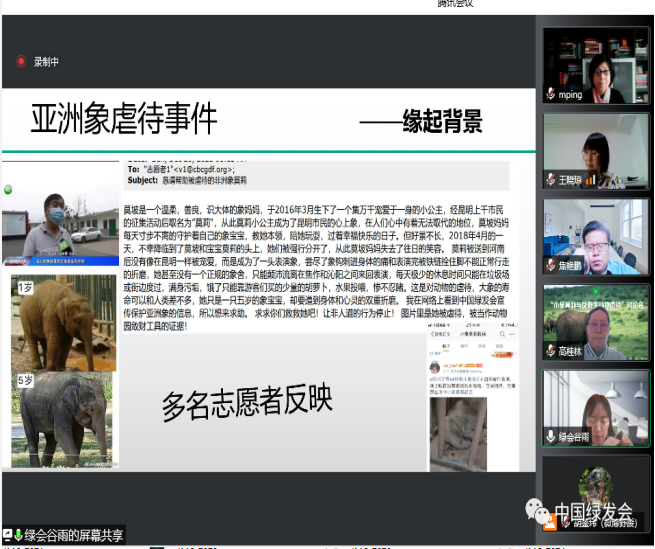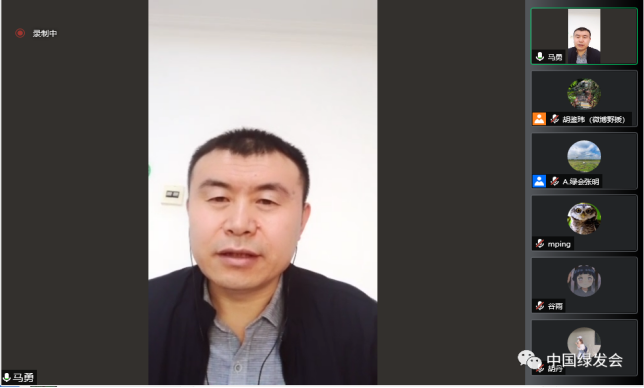The Political Research Office of China Biodiversity Conservation and Green Development Foundation(CBCGDF for short) initiated a conference on "Asian Elephants and Anti-Wildlife Abuse", in view of further responding to social concerns and promoting the research and popularization of knowledge in related issues of wildlife conservation on 29th April.

Born at Kunming Zoo in Yunnan province in 2016, an Asian elephant was transferred to Jiaozuo in Henan Province at two years of age. It was then reported to be found chained, ridden on and doing performances like playing the harmonica and standing on its head for tourists to watch, which has aroused wide concern and heated discussion on the Internet that it might have been abused.
In order to find out more details about its recent situation, the Political Research Office of CBCGDF applied for information disclosure from the State Forestry and Grassland Administration, the Ministry of Housing and Urban-Rural Development, Hesheng Forest Zoo and the Swan Lake Ecological Park in Qinyang, Jiaozuo, Kunming Zoo and other relevant organizations on January 18, 2022, but no satisfactory response was received.
To further respond to the public's concern about the Asian elephant incident and in hope of preventing the recurrence of wildlife abuse, in-depth discussions on the issue of wildlife abuse were conducted in the conference, in which a number of experts and scholars in the field of wildlife protection and environmental justice were invited to participate.
The discussions were focused on how to define wildlife abuse, how to promote and improve relevant legislation and to promote active justice.
Zhou Jinfeng, vice chairman and secretary general of CBCGDF said in his opening speech that it is necessary to learn the ethics of science and technology from the Asian elephant incident, to protect wild animals, and jointly build a community with a shared future for mankind. Asian elephant conservation is a beautiful calling card of "Good Story of China". The relocation of a herd of wild elephants in China in 2021 brought widespread international acclaim. The story of the Asian elephants reflected that awareness of biodiversity conservation was raised among the Chinese public and also with the participation of biodiversity management.

Guyu of the Political Research Office of CBCGDF made a presentation on the situation of Asian elephants and the efforts made by CBCGDF.

Professor Cao Mingde of China University of Political Science and Law put forward his own suggestions from a judicial point of view, which included to understand the definition of "abuse" by enumeration and generalization, to free animals from suffering, and to include raised animals, pets, etc. in terms of animal protection. In general, there is great need of
improvement of legislation against animal abuse and substantial attention paid to it.
Lin Liu, associate professor of Hainan Normal University and doctor of Asian elephant wild ecology, introduced the elephant's habits and physical and mental conditions in detail.
Gao Guilin, professor of the Law School of Capital University of Economics and Business, doctoral supervisor, president of the Environmental Resources Law Research Society of the Beijing Municipal Law Society, and vice chairman of the Resources and Environment Committee of the Beijing Municipal Committee of the China Democratic National Construction Association,
briefly analyzed some of the replies of the State Forestry and Grassland Administration from the perspective of legal theory and relevant legal provisions.
Jiao Yanpeng, professor and doctoral supervisor of East China University of Political Science and Law and director of the
China Environmental Crime Governance Research Center, expressed his views from the perspective of environmental criminal law.
Mang Ping, editor-in-chief of the "Nursing Life Literature Series" and director of the China Environmental Ethics Research Association, suggested that zoos should be transformed as soon as possible to protect the physical and mental health of animals, and an animal rescue center should
be established to provide professional rescue to injured animals, and access for them to return to their families.
Secretary-general of the Ethics Committee on Biology and Science (BASE) of CBCGDF, associate professor of the School of Life Sciences, Jianghan University, and Winner of the Chinese Government Friendship Award, Dr. Sara Platto said stress could have significant long-term adverse effects on elephant brains.
Zheng Yu, Wildlife Program Manager of the World Society for the Protection of Animals, proposed five principles of animal welfare, which are commonly used as a reference framework for assessing the status of animal welfare.
Qin Xiaona, founder and honorary president of the Capital Society for the Care of Animals and a supervisor of the China Medical Foundation, hoped that by rescuing Asian elephants, more attention would be paid to the survival status of performing animals and the unscrupulous businessmen would be punished for their illegal acts of making profits from abusing animals.
Gao Lihong, a professor at Zhongnan University of Economics and Law, said that it is necessary to formulate relevant policies on animal protection from a legal point of view.
Deputy Secretary-General Ma Yong of CBCGDF concluded that:
First, we will prevent relevant illegal acts from occurring , and follow up with administrative litigation and environmental public interest litigation to promote the process.
Second, these actions will deal with individual cases, and the formulation of legal policies will regulate relevant behaviors, so legislative interpretation is imperative.
Third, participation of all people is crucial to promotion of wildlife conservation.
Next,we will sort out the speeches of the participating experts and release them in detail on the media of CBCGDF, and combining the speeches of the experts, the Political Research Office of CBCGDF will also form a draft proposal and submit it to the Legislative Affairs Commission of the National People's Congress.

Original Chinese Article:
Translator: Zhao Qian
Editor: Linda
Contact the editors:
V10@cbcgdf.org;+8617319454776

Contribution
Do you know? CBCGDF is a non-profit organization. We rely on crowd-funding and
donations. You have the opportunity to help us to advance biodiversity conservation. Donate TODAY to power up the movement to make it a better world for all life.
https://www.paypal.me/CBCGDFChina
http://www.cbcgdf.org/English/ConfirmDonaTion/0.html
